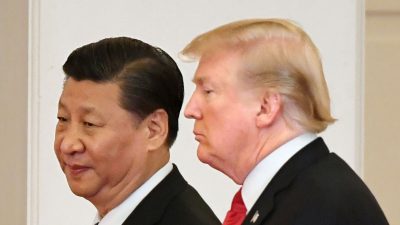Trump Regime Bans Technology Exports to China’s Leading Chip Maker

Last week, the Trump regime accused China’s Semiconductor Manufacturing International Corporation (SMIC) — its largest chip maker — of being an “unacceptable (national security) risk.”
Claiming technology shipped to the company could be used for military purposes is code language for targeting designating foreign firms, notably high-tech ones, to give US enterprises a competitive advantage.
In the case of China, it’s also all about wanting its economic, industrial, and technological growth undermined.
When charges against its firms are made, no evidence supports them because none exists.
Escalating US war on China by other means risks turning things hot by accident or design.
The South China Sea is one of the world’s leading hot spots, along with the Taiwan Strait, Middle East, and Russian border areas.
If global war erupts, it’ll likely be in one of these locations.
US rage for unchallenged dominance makes the unthinkable possible. In the nuclear age, it risks doomsday.
Like ZTE, Huawei, TikTok, and WeChat, SMIC denied fabricated Trump regime accusations, made to undermine the firm’s development and growth.
Trump’s trade war is largely a technology war. Besides stiff tariffs on targeted Chinese imports, it aims to cut its tech companies off from the US supply chain.
On Friday, Trump’s Commerce Department notified US firms that henceforth an export license is required to ship technology to SMIC, the same restriction imposed on Huawei and other targeted Chinese firms, more of the same likely to follow.
SMIC issued a statement saying:
The company “reiterates that it manufactures semiconductors and provides services solely for civilian and commercial end users and end-uses,” adding:
“The company has no relationship with the Chinese military and does not manufacture for any military end users or end-uses.”
Earlier this month, the Pentagon said it’s working with other US agencies to decide whether to blacklist SMIC by adding it to the Commerce Department’s Entity List along with Huawei, its affiliates, and other Chinese enterprises.
Targeted ones are involved in producing aviation related products, semiconductors, engineering, as well as other high-tech products and components.
Falsely claiming these enterprises act “contrary to the national security or foreign policy interests of the United States” is cover for wanting corporate America to have a competitive edge over Chinese firms.
Blacklisted ones are prohibited from purchasing US technology without Commerce Department permission.
The exclusionary list includes “businesses, research institutions, government and private organizations, individuals, and other types of legal persons — that are subject to specific license requirements for the export, reexport and/or transfer (in-country) of specified items.”
Scores of high-tech Chinese firms are included on the list, more likely to be added.
Weeks earlier in response to US actions, China tightened export controls on nearly two dozen cutting-edge technologies — the first such changes since 2008.
According to its Ministry of Commerce and Science, along with its Technology Ministry, revised controls apply to nuclear equipment and materials, seaborne satellite launching pads, equipment used in building manmade islands, artificial intelligence interface, drone technology, ultra-high voltage transmission and clean coal power generation, quantum encryption and early warning technology, metal 3D printing, as well as advanced drilling tools and software used in oil and gas extraction.
Given Trump regime policy of cutting off Chinese tech firms from the US supply chain — what Dems are likely to continue if control the White House next year — it’s essential for Beijing and its tech enterprises to develop and become independent from US suppliers.
China has the will and financial resources to achieve its objectives, a new long march that will take time to accomplish.
*
Note to readers: please click the share buttons above or below. Forward this article to your email lists. Crosspost on your blog site, internet forums. etc.
Award-winning author Stephen Lendman lives in Chicago. He can be reached at [email protected]. He is a Research Associate of the Centre for Research on Globalization (CRG)
His new book as editor and contributor is titled “Flashpoint in Ukraine: US Drive for Hegemony Risks WW III.”
http://www.claritypress.com/LendmanIII.html
Visit his blog site at sjlendman.blogspot.com.

